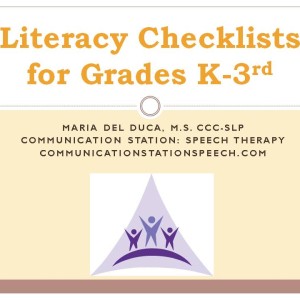A few days ago I received a phone call from a parent who was seeking a language evaluation for her child. As it is my policy with all assessments, I asked her to fill out an intake and a checklist to identify her child’s specific areas of difficulty in order to compile a comprehensive and targeted testing battery. Her response to me was: “I’ve never heard of this before? Why do I have to tell you what’s wrong with my child? Why can’t you figure it out?” Similarly, last week, another parent has questioned: “So you can’t do the assessment without this form?” Given the above questions, and especially because May is a Better Hearing and Speech Month #BHSM, during which it is important to raise awareness about communication disorders, I want to take this time to explain to parents why performing targeted speech language assessments is SO CRUCIAL.
To begin with it is very important to understand that speech and language can be analyzed in many different ways beyond looking at pronunciation, vocabulary or listening and speaking skills.
Targeted areas within the scope of practice of pediatric school based speech language pathologists include the assessment of:
- SPEECH
- The child may have difficulties with pronunciation of sounds in words, stutter, clutter, have a lisp or have difficulties in the areas of voice, prosody, or resonance. For the majority of the above difficulties completely different tests and testing procedures may be needed in order to appropriately assess the child.
- LANGUAGE
- Receptive Language
- Ability to follow directions, answer questions, recall sentences, understand verbal messages, as well as comprehend orally presented text
- Memory and Attention
- Also see executive function skills
- Expressive Language
- Vocabulary knowledge and use, formulation of words and sentences as well as production of narratives or stories
- Problem Solving
- Verbal reasoning and critical thinking skills are very important for successful independent decision making as well as for interpretation of academically based texts and complete assignments
- Pragmatic Language
- Successful use of language for a variety of communicative purposes
- Initiate and maintain topics, maintain conversational exchanges, request help, etc
- Social Emotional Competence
- Effective interpersonal negotiation skills, compromise and negotiation abilities, as well as perspective taking are integral to academic and social success. These abilities are often compromised in children with language disorders and require a thorough assessment
- Executive Functions (EFs)
- These are higher level cognitive processes involved in inhibition of thought, action and emotion, which are located in the prefrontal cortex of the frontal lobe of the brain.
- Major EF components include working memory, inhibitory control, planning, and set-shifting. EFs contribute to child’s ability to sustain attention, ignore distractions, and succeed in academic settings.
- READING DISABILITIES AND DYSLEXIA
- Phonological Awareness
- Reading Ability
- Writing
- Spelling
One General Language Test Does Not Fit All!
Children with speech and language disorders do not necessarily display weaknesses in all affected areas but may only display difficulties in selected few.

To illustrate, high functioning students on the autistic spectrum may have very strong academic skills related to comprehension and expression of language but may display significant social pragmatic language weaknesses, which will not be apparent on general language testing (e.g., administration of Clinical Evaluation of Language Fundamentals -5). Thus, the administration of a general language test will be contraindicated for these students as it will only show typical performance on these tests and will not qualify them for targeted language based services that they need. However, by administering to them a testing battery composed of tests sensitive to social pragmatic language competence will highlight their areas of difficulty and result in a creation of a targeted intervention plan to improve their abilities in the affected areas.

Similarly, children at risk for reading disabilities will not benefit from the administration of general language testing either, since their deficits may lie in the areas of sound discrimination, isolation, or blending as well as as impaired decoding ability. So the administration of tests sensitive to phonological awareness and emergent reading ability would be much more relevant.

This is exactly why taking an extra step and filling out a simple form will result in a much more targeted and beneficial speech language assessment for the child. The goal of any competent professional assessment is to eliminate the administration of unnecessary and irrelevant tests and focus only on the administration of instruments directly targeting the areas of difficulty that the child presents with. Given the fact that assessment of language covers so many broad areas, it makes perfect sense to ask parents to fill out relevant checklists/intakes as a routine part of a pre-assessment procedure. Otherwise, even after observations in school setting, I would still just be blindly ‘fishing’ for deficits without really knowing whether I will ‘accidentally stumble upon them’ using a general test at hand.
Of course, even checklists need to be targeted by age and areas of functioning. Here’s how I use mine. When performing comprehensive fist time assessments I ask the parent to fill out the comprehensive checklists based on the child’s age. These are broken down as follows:
However, oftentimes when I perform reassessments or second opinion evaluations, I may ask the parent to fill out checklists pertaining to specific, known, areas of difficulty. These currently include:
After the parent fills the checklist out, the child’s areas of difficulty literally jump out from the pages. Now, all I need to do is to choose the appropriate testing instruments, which will BEST help me determine the exact nature and cause of the child’s deficits and I am all set. I administer the testing, interpret the results and write a comprehensive report detailing which therapy goals will be targeted. And this is why pre-assessment checklist administration is so important.
Helpful Resources:
 Children at risk for auditory processing deficits can begin displaying difficulties processing and using language at a very early age (before 3).
Children at risk for auditory processing deficits can begin displaying difficulties processing and using language at a very early age (before 3). Lately I’ve been seeing quite a few speech language therapy reports with minimal information about the child in the background history section of the report. Similarly, I’ve encountered numerous SLPs seeking advice and guidance relevant to the assessment and treatment of difficult cases who were often at a loss when asked about specific aspects of their client’s background family history in order to assist them better. They’ve never delved into it beyond a few surface details!
Lately I’ve been seeing quite a few speech language therapy reports with minimal information about the child in the background history section of the report. Similarly, I’ve encountered numerous SLPs seeking advice and guidance relevant to the assessment and treatment of difficult cases who were often at a loss when asked about specific aspects of their client’s background family history in order to assist them better. They’ve never delved into it beyond a few surface details! 





 Back to school time is just around the corner and if your job is anything like mine then you are getting ready to perform a number of speech language screenings and assessments after the kids get back to school in September. In order to optimize the assessment process I’ve created a number of checklists and forms for my (and your convenience). They allow for quick and efficient determination of whether the preschool/school age monolingual/bilingual student in question requires any speech language services including: screening, assessment, future follow-up, or on-going monitoring. Please note that for bilingual students it is recommended that parents mark whether the child presents with deficits in one language or in both on the checklists (e.g., mark R, E, or B – Russian, English or both).
Back to school time is just around the corner and if your job is anything like mine then you are getting ready to perform a number of speech language screenings and assessments after the kids get back to school in September. In order to optimize the assessment process I’ve created a number of checklists and forms for my (and your convenience). They allow for quick and efficient determination of whether the preschool/school age monolingual/bilingual student in question requires any speech language services including: screening, assessment, future follow-up, or on-going monitoring. Please note that for bilingual students it is recommended that parents mark whether the child presents with deficits in one language or in both on the checklists (e.g., mark R, E, or B – Russian, English or both).

 Need a L
Need a L